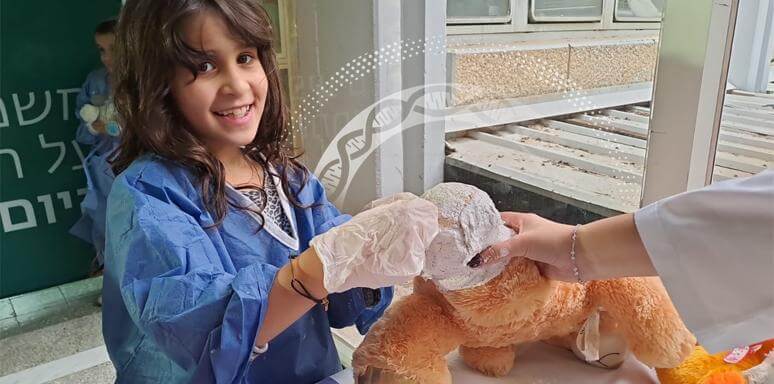Collaboration between the Faculty of Medicine, the Department of Psychology and the School of Social Work at Bar Ilan University resulted in the project - "Strength Center for Bears" - to reduce stress and anxiety and increase personal resilience among children

Bar Ilan University established a unique experimental project - "Strength Center for Bears" - to reduce stress and anxiety and increase personal resilience among children. The activity was attended by faculty members, students of medicine, psychology and social work, who helped girls, children, parents and bears cope medically and emotionally with the difficult situation in the country. The activity, suitable for ages 12-3, is expected to take place in the future, in several centers in Israel.
The idea on which the 'Strength Center for Bears' is based, is based on the well-known project that has been operating successfully for several years at the Faculty of Medicine of Bar-Ilan University in the Galilee - 'Hospital for Bears'. Boys and girls come to this event to take care of dolls and teddy bears, under the guidance of male and female students, to have an empowering experience, to vent their emotions and also to learn basic concepts in medicine - in a huggable and enveloping environment.
In the last few weeks, it was decided to expand the one-year project, to help the children deal with the feelings of anxiety and fear floating in them during this time. Since the war began and during the first month of its conduct, three meetings were held, with the participation of about one hundred children aged 12-3.
As part of the meetings, the male and female students played with the children individually or in small groups, and helped them deal with the everyday anxieties that arise naturally in the current reality, through doll therapy.
During the activity, the children and their parents received tools such as training on proper breathing and actions that each child can perform with their parents in times of stress, an alarm or while staying in the protected space. An emotional room and medical facilities such as ultrasound and plaster dressing for "wounded" bears were opened there. In these complexes, the flowers of medicine on the dolls demonstrated the various treatment options and thus contributed to reducing the fear and feeling of uncertainty in the face of threatening medical procedures. Along with the students, professionals from the various faculties of the university were also present: Dr. Tamar Zilberg, Dr. Tali Gab, and Prof. Rachel Dekel, who developed the unique therapeutic protocol. Bar Sudai, 6 years old, Petach Tikva said at the event, after spending time in the emotional room with female psychology students: "When the bear is a little stressed in the MMD, you can make soap bubbles and pet the bear. Sometimes when he's scared, you can hug him and also tell him that an iron dome protects us."
Lial Strom, the mother of three-year-old Sinai, who arrived after being evacuated from Kibbutz Saad, shared: "This is the first time since October 7 that the child agrees to talk to a professional. He was happy and calm with the therapeutic tools he received, in the form of a game, and we, the parents, also left with tips for dealing with stressful situations."
During one of the meetings, children from the south and the center who were present at the event, had to go down to the shelter during it due to an alarm. Yael Golan, the producer of the event from the Department of Psychology, said that the descent to the shelter was carried out quietly, and that in the shelter itself many children were observed practicing methods that were learned a few minutes earlier.
Prof. Noa Wilchinsky from the Department of Psychology, head of the dedicated programs at Bar-Ilan University, concluded: "The responses from the children and parents are heart-warming. We are told that the children practice the tools they learned at home as well, during the alarms. They remind parents what to do and even tell about it in kindergartens and schools."
The university plans to expand the project in the near future and send the volunteers to suitable centers throughout the country, so that the boys and girls can also take care of the bears in other places, learn medical concepts and have an empowering and enveloping experience.
More of the topic in Hayadan:
- The one that rises and the one that falls: the national resilience of the coalition supporters compared to that of the opposition supporters
- The lockdown during the corona epidemic caused a structural change in the areas of stress and anxiety in the brain
- Depression and anxiety predict a future increase in pain levels, but not the other way around
